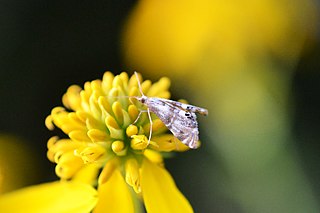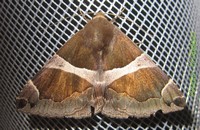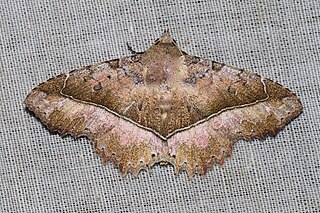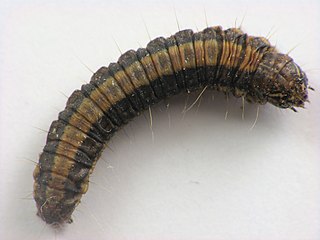
The Pyralinae are the typical subfamily of snout moths and occur essentially worldwide, in some cases aided by involuntary introduction by humans. They are rather rare in the Americas however, and their diversity in the Australian region is also limited. Altogether, this subfamily includes about 900 described species, but new ones continue to be discovered. Like many of their relatives in the superfamily Pyraloidea, the caterpillar larvae of many Pyralinae – and in some cases even the adults – have evolved the ability to use unusual foods for nutrition; a few of these can become harmful to humans as pests of stored goods.

Elysius is a genus of moths in the family Erebidae. The genus was erected by Francis Walker in 1855.

Poliopastea is a genus of tiger moths in the family Erebidae. The genus was erected by George Hampson in 1898.

Saurita is a genus of moths in the subfamily Arctiinae. The genus was erected by Gottlieb August Wilhelm Herrich-Schäffer in 1855.

Aulacodes is a genus of moths of the family Crambidae. The genus was first described by Achille Guenée in 1854.

Eoophyla is a genus of moths of the family Crambidae. It was erected by Charles Swinhoe in 1900.
Undulambia is a genus of moths of the family Crambidae.

Petrophila is a genus of moths of the family Crambidae. The genus was described by Lansdown Guilding in 1830.

Bocula is a genus of moths in the family Erebidae. The genus was erected by Achille Guenée in 1852.

Catephia is a genus of moths of the family Erebidae. Most species of this genus are found in Africa.

Corgatha is a genus of moths of the family Erebidae erected by Francis Walker in 1859.

Dysgonia is a genus of moths in the family Erebidae. The genus was erected by Jacob Hübner in 1823.

Tamba is a genus of moths in the family Erebidae. It was erected by Francis Walker in 1869.

Aglossa is a genus of small moths belonging to the family Pyralidae. It was described by Pierre André Latreille in 1796. They are found mainly in western Eurasia, though some species have been introduced elsewhere.

Hypsopygia is a genus of moths belonging to the family Pyralidae. Though fairly small, they are large among their relatives. It was described by Jacob Hübner in 1825.

Desmia is a genus of moths of the family Crambidae. The genus was erected by John O. Westwood in 1832.

The Chrysauginae are a subfamily of snout moths. They are primarily Neotropical and include about 400 described species.

The Epipaschiinae are a subfamily of snout moths. Almost 600 species are known today, which are found mainly in the tropics and subtropics. Some occur in temperate regions, but the subfamily is apparently completely absent from Europe, at least as native species. A few Epipaschiinae are crop pests that may occasionally become economically significant.

Endotricha is a genus of snout moths. It was described by Philipp Christoph Zeller in 1847.
Graphosia polylophota is a moth of the family Erebidae. It was described by George Hampson in 1914. It is found on New Guinea. The small to medium-sized adults are often white, yellow, orange, or red with black markings on the forewings.

















